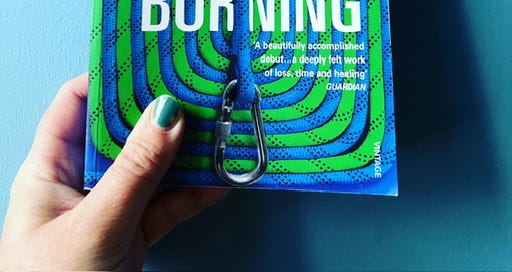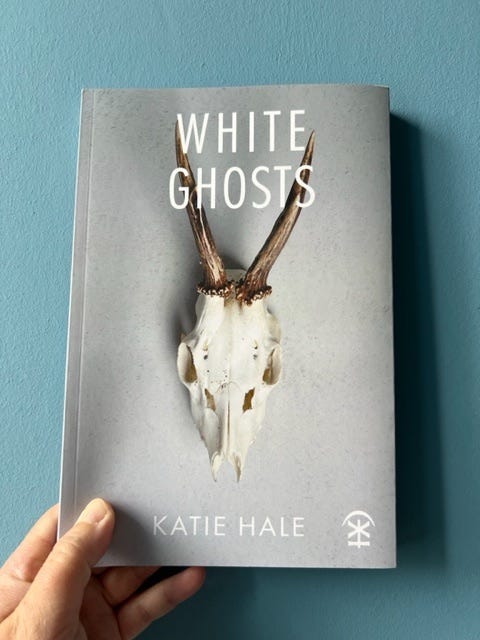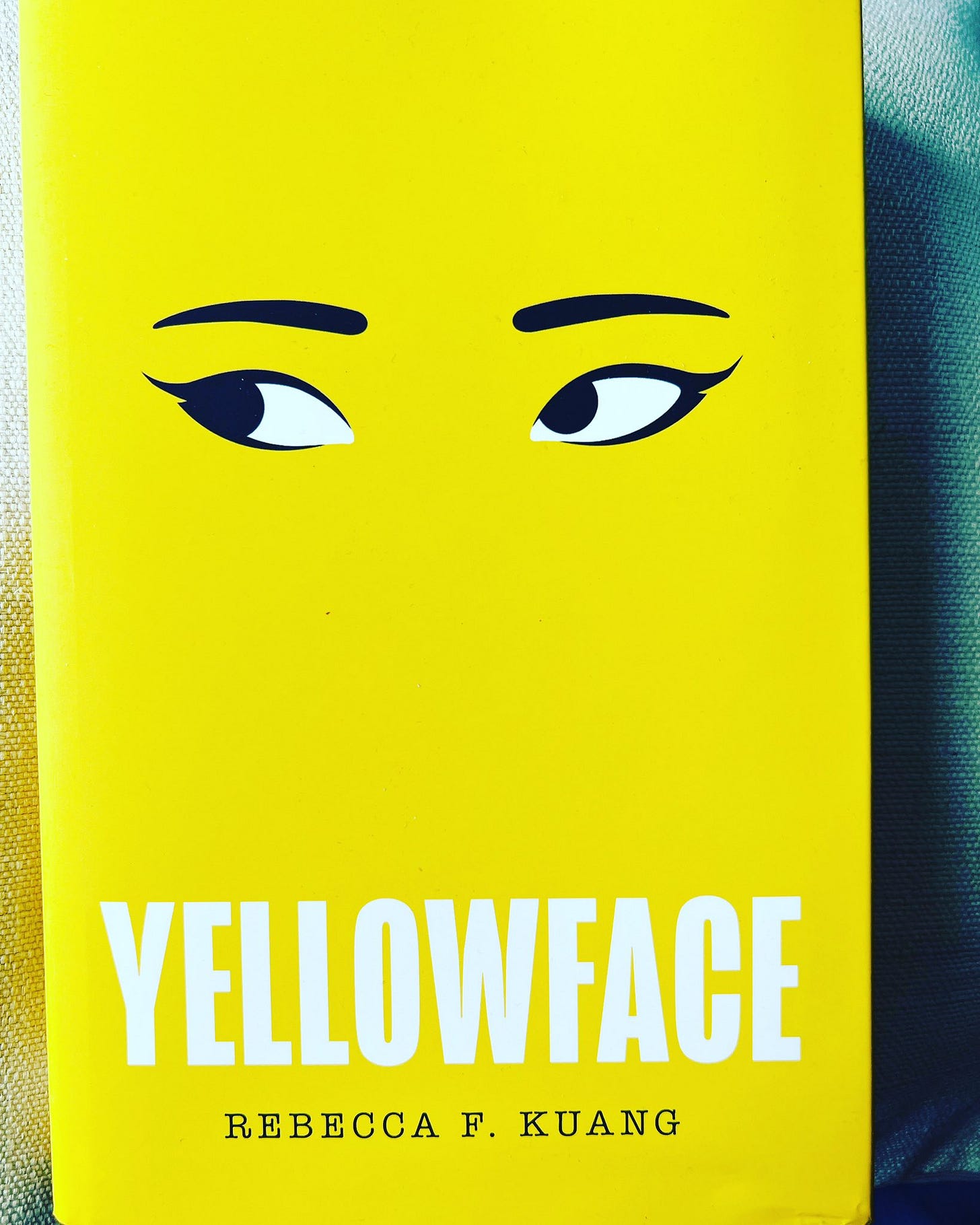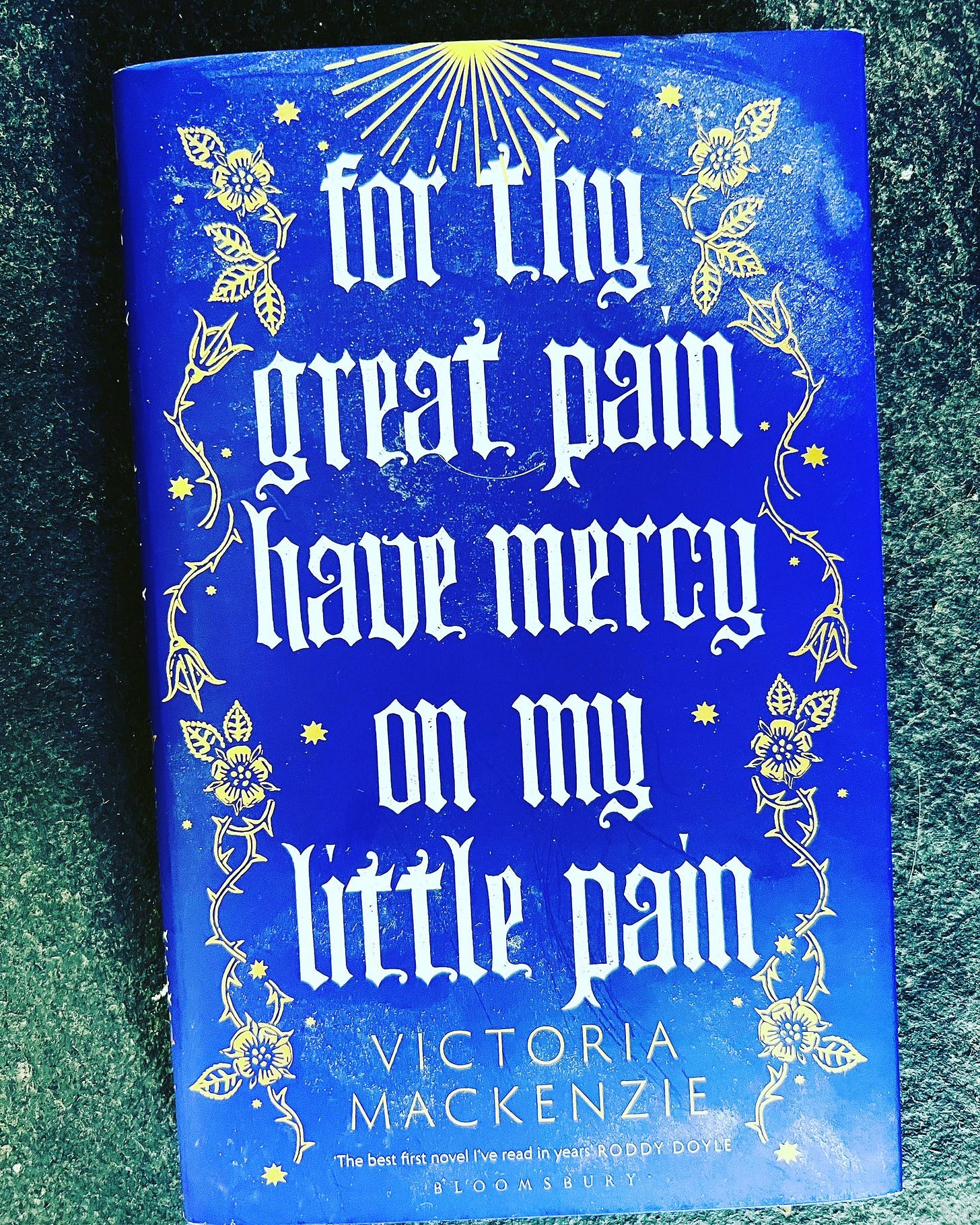"I see all the things we write and publish as markers in time." Helen Mort on 'Black Car Burning'
plus book club choice for July Katie Hale 'White Ghosts'
The Books from the Margin book club choice for June was Helen Mort’s brilliant debut novel Black Car Burning. I’m always interested to see how writers who are known as poets come to the fiction genre. Black Car Burning is beautifully written, but it is also a gripping read. The plot is textured, with the landscape itself providing tone and character. Helen Mort doesn’t shy away from difficult themes, including the Hillsborough disaster and immigration. She tackles big subjects elegantly, with a careful eye for the nuances within polarised opinions. The book club met up to chat about the book, and books in general, last week. It was a lively and intelligent discussion group, as usual, in which we found ourselves exploring what it meant to write about trauma that was not directly our own, who owns the story of a town, how we write about immigration and the cultural difficulties, and joys, that a multi cultural societies deal with. Thank you Helen for your thoughtful and fascinating answers to our questions.
1. Do you define yourself as a poet writing prose, or a cross
genre writer, and how confident did you feel writing a novel when you
are so well known for your poetry?
That's a good question. I definitely went into the novel with that
poet-writing-prose feeling, but I also knew that I didn't want to
produce the classic 'poet's novel' (I think when people say that about
a novel they mean it is beautifully written without much plot!).
Nowadays I would just define myself as a writer because I work across
genres. And when I was a kid that's what I wanted to be - not a poet
specifically but an author.
2. How long did it take for you to write the novel?
About 4 years all in all - I finished the last parts of it in 2017
3. Where did the idea for Black Car Burning come from?
I think it explores themes that constantly fascinate me - trust, risk,
the memory of place.... it sort of emerged organically as an idea at a
time when I was doing a huge amount of climbing and I knew from the
outset it was an idea for prose rather than a poem. I was very
influenced by M. John Harrison's book 'Climbers' which I think is the
ultimate novel.
4. There are themes in the book that are very challenging,
Hillsborough in particular must have been difficult to write about. Do
you have direct experience of the tragedy, and how comfortable were
you writing about a tragedy that has been at the heart of so much
social unease.
Absolutely, you have to tread carefully. Hillsborough cast a long
shadow over Sheffield when I was growing up and I wanted to capture
that sense of presence. Because I wasn't there that day myself, I knew
I didn't want to try and 'reimagine' the events of the day in a
detailed manner because it wouldn't feel respectful to those involved.
So I chose to have one of my characters doing exactly what I was doing
- researching the tragedy and its aftermath. Only, unlike me, my
character was traumatised by Hillsborough. At the time I was writing
the novel, there had just been a big inquest, so Hillsborough was back
in the public consciousness again. Though of course there are people
who have never had the luxury of it not being at the forefront of
their minds.
5. Why did it matter to you that you wrote this particular novel
at the time that you did, was there an underlying motivation?
I was very aware at the time of issues of lack of trust in South
Yorkshire police in the news and I wanted to address why that might
be. There were also a lot of community tensions in Page Hall, east
Sheffield that were being covered by the media. I think a novel or a
work of art can be a more powerful way of addressing some of the
nuances of these 'stories' we see reported. I wanted to look in detail
at the problem of trusting other human beings and some of the
imperfect solutions we come up with! I wanted to look at that in our
closest relationships too. I'd been listening to people who are
consensually non-monogamous complaining about how their relationships
were never properly represented in art and that when polyamory is a
theme it's addressed in a simplistic way. So I also wanted to explore
that as something that was part of my characters' lives but not what
defined them. My message there was 'trusting other people is just
really hard word, monogamy isn't a perfect solution, polyamory isn't a
utopian alternative, trust just requires work!'.
6. Are you a rock climber?
Yes! It's my favourite hobby and I love writing about it. When I'm
writing and when I'm climbing, those are the only times I feel truly
'in the moment'.
7. You make some bold author choices in Black Car Burning; having
the landscape as a personified voice so that it becomes a character in
the book is one of them. Making bold and innovative choices when
writing is often met with criticism in workshop groups etc. Did you
have a set of people that you could share your work with and receive
feedback from? Were there ever times when you had to stand your ground
around your choices?
No, not at all, apart from my interactions with my editor, writing the
book was a fairly solitary process. The personified landscape was a
relatively late addition to the book and something that just 'felt'
right. Because I was exploring the cultural memory of place I wanted
the places in the novel to speak, to have opinions about my characters
as well as vice versa.
8. How did you feel when you finished the book?
Exhilarated. The ending came to me in a dream! I was in Canada
sleeping on my friend's sofa bed in Vancouver and suddenly had this
vivid dream about paraglider and I knew the book would finish with
them arriving, somehow. Very weird!
9. Would there be anything you would change about the book if you
could go back in time?
I see all the things we write and publish as markers in time. There
wouldn't be any point changing it, any more than there would be value
in trying to change your former self. As they say on Love Island, 'it
is what it is'.
10. Do you have a set process for writing?
The only constant is that I can't write well if I'm not also reading.
Poems can exist on the periphery of my life, they just insist if they
need to be written. Long form prose is different: it requires you to
show up, day after day, and put the time in, listen to your
characters.
Book Club Member’s Recommendations
Liked what Helen Mort did with Black Car Burning? You might enjoy these recommendations from book club members.
This novel: Climbers by M. John Harrison
This podcast: The Essay: Helen Mort on Sylvia Plath
This non fiction book: The Living Mountain by Nan Shepherd
July Books from the Margin Book Club Choice
July’s Books from the Margin Book Club choice is Katie Hale’s poetry collection, White Ghosts, from Nine Arches Press. I’ve heard such good things about this collection. White Ghosts has been on my radar for a while, so I’m glad to get the chance to read it, discuss it with book club members and put some questions to Katie herself. Here’s a bit about the book, from the Nine Arches website:
White Ghosts, the debut collection by poet and novelist Katie Hale, traces maternal lines, and the legacies of slavery and whiteness interwoven into the fabric of America, through revealing, unflinching poems. Travelling deep into an intimate history that spans both sides of the Atlantic, Hale unravels the language haunting those narratives we choose to tell in official versions – through museum labels and civic statues – and in handed-down stories.
Transformational and challenging, these sharply-detailed poems interrogate the bare bones of silence, complicity, difficult inheritances and racial constructs. Via wagon routes or interstates, on desert highways or in the landscapes of northern England, through nature and through human culture, questions of ownership and power are writ into the journey. Through four hundred years of female migration, the poems in White Ghosts use art, music, and lyrical reworking of the curated space, to address white guilt: what is lost through generations, and what is passed on?
The next book club book chat is on Sunday 16th July 10am-11am (UK time). It’s a pay what you can event, £1-£10 and you don’t have to have read the book. Just come along and enjoy the book chat in a friendly and welcoming zoom environment. Sign up for the book club chat and get 15% off at the glorious Poetry Pharmacy too.
What I Read in June
I can’t believe we are at the end of June already. I was back on form, motoring through my To Read pile, and refilling it. Here’s what I read.
Yellowface Rebecca F. Kuang
It is phenomenal. I couldn’t put it down. Tense, witty, clever, horrifying (esp. if you’re an author- stuff of nightmares). I hated, but somehow also felt a great deal of compassion for the protagonist.
For Thy Great Pain Have Mercy on My Little Pain by Victoria Mackenzie
horoughly enjoyed. Felt a genuine closeness to the women portrayed. Elegant, thoughtful, interesting. Highly recommend.
Trespasses by Louise Kennedy
One of the best novels I’ve read. When the bad thing happened, I put my hands over my eyes and couldn’t carry on for a while. It is that good. What a fantastic journey. I wish I could read it again for the first time.
Split, Twist, Apocalypse by Nina Parmenter
Vibrant, often funny, sometimes moving poems that rattle the reader along through this well structured collection. Good stuff.
Thanks for stopping by, see you next time
x










Thanks for this, sorry I couldn’t join you this time. Loved the landscape in this book.